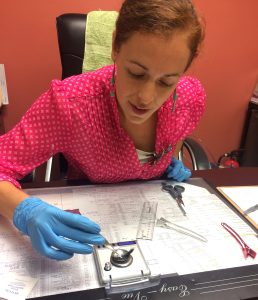 The Department of Anthropology at The University of Alabama has a diverse research program in the following specialties:
The Department of Anthropology at The University of Alabama has a diverse research program in the following specialties:
- Biocultural Medical Anthropology
- Human Biology
- Psychological Anthropology
- Applied Anthropology
- Identities and Inequalities
- Education, Outreach, and Community Engagement
- Decolonization
- Archaeological Science
- Archaeology of the Americas
- Museum Anthropology and Cultural Resource Management
Learn more about current research projects in the department by visiting the Facilities & Labs page, or browse our directory.
Biocultural Medical Anthropology
Biocultural Medical Anthropology, a specific approach within the more general subfield of medical anthropology, strives to understand why people grow and develop as they do and why they may be at risk for health problems. The core faculty in this specialty includes the following:
- Dr. Jason DeCaro: life course health and development, global health, maternal/child health, social epidemiology, biocultural-linguistic approach, culture and health
- Dr. Courtney Helfrecht: life course health and development, global health, maternal/child health, nutritional anthropology, culture and health
- Dr. Holly Horan: life course health and development, global health, maternal/child health, nutritional anthropology, social epidemiology, health inequities, reproductive health and justice, culture and health
- Dr. Christopher Lynn: culture and health
- Dr. Stephanie McClure: life course health and development, social epidemiology, health inequities, culture and health
- Dr. Lisa Pawloski: global health, maternal/child health, nutritional anthropology, culture and health
- Dr. Sonya Pritzker: biocultural-linguistic approach, culture and health
- Dr. Diane Tober: life course health and development, global health, maternal/child health, health inequities, reproductive health and justice, science and technology, culture and health
Human Biology
Human Biology focuses on a blend of social and biological studies to examine how living populations evolve. The core faculty in this specialty includes the following:
- Dr. Jason DeCaro: neuroanthropology
- Dr. Courtney Helfrecht: human behavioral ecology, human evolutionary biology
- Dr. Holly Horan
- Dr. Christopher Lynn: human behavioral ecology, human evolutionary biology, neuroanthropology, experimental anthropology
- Dr. Lisa Pawloski: human behavioral ecology
- Dr. Diane Tober
Psychological Anthropology
Psychological Anthropology is an interdisciplinary field that examines the interplay between individual psychology and cultural and social influences to explain human behavior. The core faculty in this specialty includes the following:
Applied Anthropology
Applied Anthropology “puts to use” our disciplinary research methods and theories in order to solve problems and encourage change in human behavior and cultural living patterns. The core faculty in this specialty includes the following:
Identities and Inequalities
This blend of anthropology and sociology examines how identities, such as class, race, ethnicity, gender, and sexuality, create a sense of belonging among living populations, while also creating a source of tension as inequalities are produced across identities. The core faculty in this specialty includes the following:
- Dr. Elliot Blair
- Dr. Katherine Chiou: class and status, intersectionality
- Dr. Marysia Galbraith: class and status
- Dr. Courtney Helfrecht: race and ethnicity, gender and sexuality
- Dr. Holly Horan: race and ethnicity, gender and sexuality, class and status, intersectionality
- Dr. Stephanie McClure: race and ethnicity, gender and sexuality, class and status, intersectionality
- Dr. Sonya Pritzker: race and ethnicity, gender and sexuality, class and status, intersectionality
- Dr. Diane Tober: race and ethnicity, gender and sexuality, class and status, intersectionality
Education, Outreach, and Community Engagement
The core faculty in this speciality includes the following:
- Dr. Katherine Chiou
- Dr. Marysia Galbraith
- Dr. Courtney Helfrecht: evolution education
- Dr. Holly Horan
- Dr. Christopher Lynn: evolution education
- Dr. Lisa Pawloski
- Dr. Diane Tober
- Dr. Flavio Silva
- Dr. Claire Thompson
Decolonization
Decolonization is the process of undoing colonization, in a literal and theoretical sense, by centering racial justice and marginalized groups in order to produce an equitable transformation in the academic community and beyond. The Decolonization Committee is a joint faculty/graduate student body that leads these efforts in the Department of Anthropology. The core faculty in this specialty includes the following:
- Dr. Elliot Blair
- Dr. Katherine Chiou
- Dr. Courtney Helfrecht
- Dr. Holly Horan
- Dr. Stephanie McClure
- Dr. Sonya Pritzker
- Dr. Diane Tober
- Dr. Flavio Silva
Archaeological Science
Using scientific research methods, archaeologists determine what historic cultures were like by looking at the material remains people leave behind. The core faculty in this specialty includes the following:
- Dr. Elliot Blair: archaeological geophysics, archaeometry
- Dr. Rachel Cajigas: environmental archaeology, archaeological geophysics
- Dr. Katherine Chiou: environmental archaeology, digital archaeology
- Dr. Cameron Lacquement: archaeological geophysics, experimental archaeology
- Dr. Flavio Silva: environmental archaeology, archaeometry, digital archaeology, applied archaeology, experimental archaeology
- Dr. Claire Thompson: applied archaeology, experimental archaeology
- Dr. Alexandre Tokovinine: digital archaeology, applied archaeology
Archaeology of the Americas
Archaeologists specialize in specific areas around the world to develop expertise on particular people, places, and issues. Archaeology of the Americas focuses on Mesoamerica, North America, Central America, South America, and the Caribbean. The core faculty in this specialty includes the following:
- Dr. Elliot Blair: Southeastern archaeology
- Dr. Rachel Cajigas: Southeastern archaeology
- Dr. Katherine Chiou: Andean archaeology, landscape archaeology/household archaeology
- Dr. Cameron Lacquement: Southeastern archaeology, landscape archaeology/household archaeology, monumental architecture
- Dr. Flavio Silva: Mesoamerican archaeology, Southwestern archaeology, landscape archaeology/household archaeology, monumental architecture
- Dr. Claire Thompson: Southeastern archaeology, landscape archaeology/household archaeology
- Dr. Alexandre Tokovinine: Mesoamerican archaeology, landscape archaeology/household archaeology, monumental architecture
Museum Anthropology and Cultural Resource Management
Museum anthropology studies all aspects of the theory and practice of museum operations, including the history of museums, their role in society, and specific systems for education, administration and cultural resource management. Cultural resource management may be understood in a broad sense as the preservation of places, objects, structures, buildings, and evidence of past material culture and life.